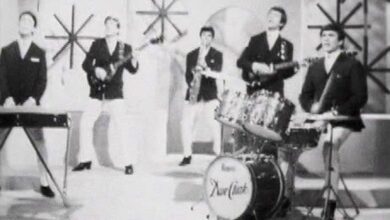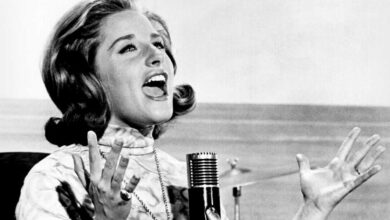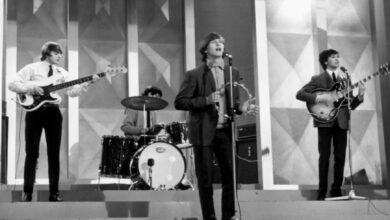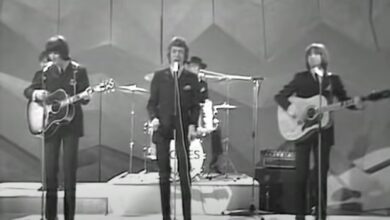Scotty McCreery Delivered A Soulful Performance Of “Hello Darlin’” At The Grand Ole Opry
Conway Twitty’s “Hello Darlin'” stands as a timeless testament to the evocative power of country music. Released in March 1970, this poignant ballad quickly became Twitty’s signature song, resonating deeply with audiences and solidifying his place in the annals of country music history. Its enduring appeal lies in its heartfelt lyrics and Twitty’s soulful delivery, capturing the universal emotions of love, regret, and longing.
Born Harold Lloyd Jenkins on September 1, 1933, in Friars Point, Mississippi, Twitty’s musical journey began in the realms of rockabilly and rock ‘n’ roll. Inspired by Elvis Presley, he recorded “It’s Only Make Believe” in 1958, a track that many listeners mistook for a Presley song due to its style and Twitty’s vocal delivery. The song sold four million copies, marking Twitty’s initial foray into the music industry. However, his passion for storytelling and emotive ballads eventually led him to country music, where he found his true calling.
The conception of “Hello Darlin'” dates back to 1960, a full decade before its release. During his rock ‘n’ roll phase, Twitty often penned country songs but lacked the platform to showcase them. He would store these compositions, including “Hello Darlin’,” in a box, awaiting the right moment. By 1969, having transitioned to country music, Twitty revisited this gem. Feeling that the opening line lacked impact, producer Owen Bradley suggested Twitty speak the line, “Hello darlin’, nice to see you,” adding a conversational intimacy that became the song’s hallmark.
The narrative of “Hello Darlin'” is both simple and profound. It tells the story of a man who encounters an old flame. He attempts to convey that he’s doing well without her, yet his true feelings seep through as he admits to sleepless nights and lingering sorrow. The song’s raw honesty and relatable theme struck a chord with listeners, propelling it to the top of the Billboard Hot Country Singles chart, where it remained for four weeks. It was also named the No. 1 song of 1970, cementing its place in country music lore.
Twitty’s performance of “Hello Darlin'” at the Grand Ole Opry remains one of the most memorable moments in the venue’s storied history. His rich, tremulous baritone filled the auditorium, captivating the audience and showcasing his unparalleled ability to convey deep emotion through song. This performance not only highlighted Twitty’s vocal prowess but also his innate connection to the themes of love and loss that permeate country music.
Throughout his illustrious career, Twitty achieved an astounding 40 No. 1 hits on the Billboard Hot Country Songs chart, a record that stood for two decades until surpassed by George Strait. His collaborations with Loretta Lynn further showcased his versatility and deep understanding of the genre, producing timeless duets that remain beloved to this day.
The impact of “Hello Darlin'” extended beyond the United States. In a gesture of goodwill during the 1975 Apollo-Soyuz Test Project, American astronauts played a Russian-language version of the song, titled “Privet Radost,” to Russian cosmonauts. Twitty had worked with a language professor to record this phonetic rendition, highlighting the song’s universal appeal and its role in fostering international camaraderie.
Over the years, “Hello Darlin'” has been covered by numerous artists, each bringing their unique interpretation to the classic. Notable renditions include those by Loretta Lynn, George Jones, and Charley Pride, among others. These covers attest to the song’s enduring influence and its ability to resonate across different audiences and generations.
In popular culture, “Hello Darlin'” has made several notable appearances. A clip of Twitty performing the song on the television show “Hee Haw” was featured in an episode of “Family Guy,” introducing the classic to a new generation of viewers. Additionally, the song was featured in the finale of the TV show “Friday Night Lights,” underscoring its lasting impact and relevance.
Twitty’s legacy in country music is profound. His ability to blend heartfelt lyrics with soulful melodies set a standard in the industry. “Hello Darlin'” exemplifies this blend, showcasing his talent for storytelling and his deep connection to the human experience.
The song’s success also had a significant impact on Twitty’s career trajectory. It solidified his transition from rock ‘n’ roll to country, allowing him to explore deeper, more emotive themes in his music. This shift not only broadened his audience but also influenced future generations of country artists.
In recognition of its cultural significance, “Hello Darlin'” was added to the Grammy Hall of Fame in 1999. This honor reflects the song’s enduring appeal and its importance in the tapestry of American music history.
Today, “Hello Darlin'” continues to be celebrated as one of country music’s quintessential ballads. Its themes of love, regret, and nostalgia remain as relevant now as they were over five decades ago. Listeners, both old and new, find solace and connection in its timeless lyrics and melody.
Conway Twitty’s “Hello Darlin'” is more than just a song; it’s a narrative that captures the complexities of human emotion. Its lasting influence on the music industry and its ability to touch the hearts of listeners across generations stand as a testament to Twitty’s artistry and the universal language of music.



